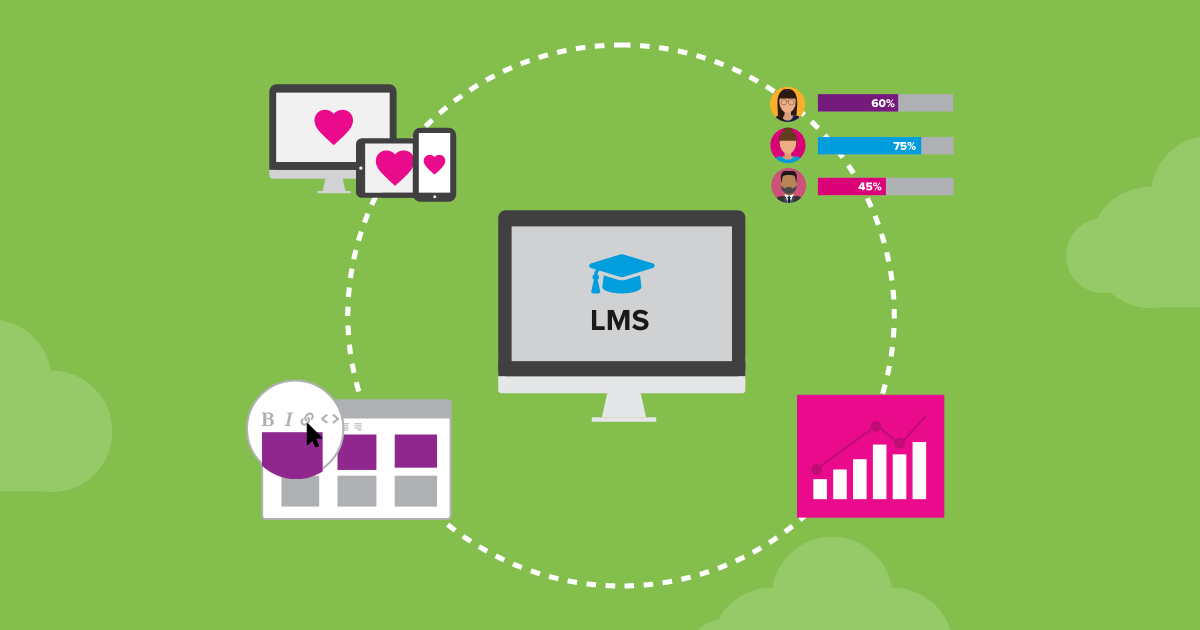A learning management system (LMS) can be a powerful tool to enhance your content marketing efforts. By inviting prospects into your unique learning environment, you’re able to make valuable connections while providing a personalized learning experience and establishing your brand as a trusted solution.
Attracting, engaging and converting leads is a fundamental goal of every content marketing strategy—but the methods for successfully guiding leads through the sales funnel can vary.
By integrating learning management system (LMS) software, you’re introducing your audience to a tailored learning environment where you can monitor, engage with and manage prospects and customers. Continue reading to find out how you can kickstart your LMS content marketing strategy.
The Power of a Learning Management System

An LMS is a software as a service (SaaS) tool to deploy and monitor online learning initiatives. This software has traditionally been tailored toward onboarding new hires and carrying out employee training; however, the unique learning environment can be key in converting prospects into customers.
Track Engagement with Your Content
Typically, your content marketing materials like blogs, infographics, webinars and informational videos, live publicly on your website or social channels. These forms of content provide rich value-add to your brand—but trackability of potential leads can be more limited with these formats.
By uploading your Microsoft Office files, images, PDFs and video files into an LMS, though, you’ll be able to implement metrics capabilities to track who is accessing which type of content, giving insight into who exactly your audience is and their pain points. Users will provide their contact information upon accepting your link invite to access your LMS, allowing you a clear visual of your audience.
Generate and Monitor Leads
Tracking prospect engagement and nurturing leads can often be a challenge without a long-term sales plan in place. Often it comes down to reaching out to prospects in a sea of competition and potentially losing a lead before you even get the chance to nurture it through the sales funnel.
By supporting leads in an LMS, you’re not only enhancing your prospects’ learning experience with a variety of useful information—but you’re doing so in an environment that allows for detailed monitoring and tracking of user activity.
Within an LMS, you can create customizable invite links tailored to the user, what his or her role is and what he or she is hoping to achieve by accessing your content. You can still deploy your traditional content marketing strategies—but complement them with customized learning software that gives a name and email address to the prospect looking for a solution.
And, a dynamic LMS will have CRM integration capabilities, so you’ll be able to further your nurturing efforts by syncing your new contacts who have already accessed your LMS. Deploying a content marketing strategy with LMS integration means gathering and keeping leads, understanding their pain points and presenting your business as a solution without overwhelming and driving away a potential customer.
Create a valuable list of contacts and gain a clear picture of what information each contact is searching for so you can better shape their learning experience. In return, they will remember you as a helpful and trusted source of information and will turn to your business as a solution to their problem.
Gather Valuable User Metrics

Metrics reporting is an invaluable way to measure the success of your marketing materials. It’s important to first understand why you should track metrics and which ones should be prioritized. An effective LMS will have robust metrics and analytics features built in to help guide your learning actions, so ensure you choose an LMS with the metrics features that will best coincide with your content marketing efforts.
Some useful metrics an LMS can track:
- User learning progress and proficiency
- Completion rates
- Time spent within the LMS
- Frequency of content views
- Post-learning surveys/feedback
By tracking the metrics of users within an LMS, you’ll have the ability to consistently improve your strategy, refining the best methods to reach certain audiences.
Integrate Social Media
Your company's social media profiles play an integral part in your LMS content strategy, as they offer another place to reach target audiences and promote your valuable educational content.
- Twitter has over 145 million monetizable daily active users, giving you a wide range of potential customers to market to. Twitter is useful for real-time discussion with your audience, as well as offering quick insight into your LMS content for interested viewers.
- With a staggering 3 million searches per month, YouTube is the second largest search engine behind Google. Utilize YouTube to share lead generating video content that informs users about your brand in an engaging way. When users are ready to take it a step further, you can invite them to access your LMS for even more information to help guide them through the buyer’s journey. You’re able to gather valuable contact information as users access your platform, and in return, users are given special access to content tailored to helping them find a solution to their problem.
- 57 percent of consumers say that social media influences their shopping—and of that percentage, 44 percent say Facebook is the most influential. Facebook offers a surplus of built-in tools to share, manage and track a variety of content. And, Facebook’s platform can easily help you inform your audience about your brand with targeted advertisements. When a lead is ready to learn more about your business, invite them to access your LMS for additional content.
- LinkedIn generates the highest lead conversion rates among social platforms with a 277 percent higher rate than Facebook and Twitter, making it an integral social platform for B2B marketing. Share insightful content with other industry leaders, build your professional relationships and when the time is right, invite prospects to learn more about what you can do for them through your LMS.
LMS Marketing Tactics to Keep in Mind
Implementing LMS software into your content strategy can provide prospective customers with the knowledge and resources needed to make a purchasing decision. Take a look at the following useful trends you should incorporate into your LMS content strategy.
Optimize for Keywords
When marketing your LMS, keep your search engine optimization (SEO) efforts top of mind. It’s optimal to focus on 4-5 keywords that pertain to one particular problem in order to better personalize your customers’ learning experience and narrow your targeting efforts. One key trend in SEO research is to see what common keywords your competition is using and how difficult are they to rank for. See which keywords are working for them and where you have opportunities you can tap in to so you can best promote your LMS.
Post and Update Consistently
When you distribute educational content, you establish yourself as a knowledgeable and trusted source for information. Inconsistent publishing of that content can create doubt and a loss of that trust, especially in a digital world full of consistently updated and new information—and this is true for your LMS content, as well. You want to ensure it is consistently refreshed and optimized with current SEO trends.
Share the Right Type of Content
The goal of LMS marketing is to make meaningful connections with users and help them find solutions to their pain points. This means you need to segment your content for each stage of the buyer’s journey to ensure you’re putting your audience’s needs first—which helps ease prospects through the sales funnel without overwhelming them.
- Awareness Stage: This stage is where buyers begin their journey, becoming aware they have a problem that needs solving. When leads are in this stage, you want to ease them into finding a solution by providing general information on the industry itself, a clear description of their problem and potential problem solvers that exist for further research. Remember: This is not the time to push your product or service or ask buyers to reach out to a sales rep.
- Consideration Stage: Those in the consideration stage may benefit from information on your brand specifically, so it could be beneficial to provide overview videos about your brand’s mission or ideals. Another great piece of content to share is customer success stories from those who chose your business for their problems. This provides real-life results that your business knows what its doing and is pleasant to work with. Here is where the buyer will consider all of their options.
- Decision Stage: When the buyer is ready to make a purchase, you should provide detailed product and services guides or how-to videos that show the specific and unique features of your product or service. When they choose your business as their solution, guide them to the appropriate contact information and allow them to reach out to a sales representative on their own.
Consider Customer Feedback
Customer feedback is invaluable information and ignoring that feedback or failing to collect it can be detrimental to the growth of your business. Negative experiences are bound to happen and should always be addressed and taken seriously. You want your customers to know you care about their experiences and are open to adjusting your content strategy to better suit users when it’s needed. Taking the time to survey how a customer’s experience was helps you understand how effective your LMS is and gives your customers the opportunity to be heard.
Getting Started with Your LMS Content Marketing Strategy

Ready to integrate LMS software into your content strategy and boost your marketing efforts? The Konvert™ LMS is your solution to delivering detailed learning content to prospects and customers alike—no matter what stage of the buyer’s journey they’re in. Segment and tailor your content to each unique user and gain valuable connections all in one secure location.
Reach out today and let us help you create the right LMS content strategy for your marketing needs.